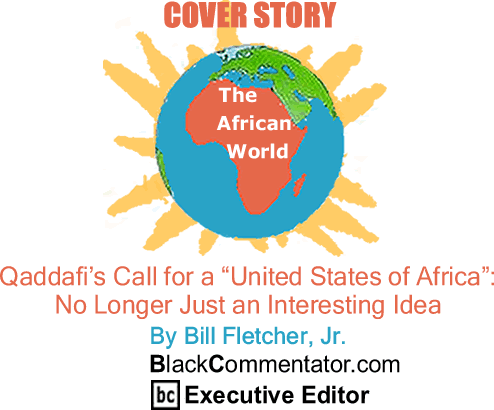
|
|||||||||||||||||||||||

|
|

Custom Search
|
|
 |
|
It
is easy for many people in the global North to write off Although
this has long been Qaddafi’s dream, this is not one that he originated.
Throughout the African World, for most of the 20th century and into
the 21st, there have been those who have dreamed, suggested and/or
fought for a unified Africa; Marcus Garvey, Kwame Nkrumah, W.E.B.
Dubois and Kwame Ture being only four of the better known proponents.
Yet these dreams have been frustrated by various factors,
not the least being virulent opposition from the countries of the
global North (particularly Western Europe and the Qaddafi’s insistence on the need for African unity has gained significant international attention. The mainstream media, however, has gone out of its way to bring forward anonymous African leaders who are quoted as dismissing the call for a “United States of Africa” as, at best, premature and, at worst, delusional. But is it either? Irrespective
of Col. Qaddafi’s intentions, his call for African unity could not
be more timely, albeit still quite difficult to realize. The current
global economic crisis demonstrates that the approach toward economic
development pushed by the What Qaddafi, and those who traveled this road before him, recognize is that the boundaries the current African nation-states inherited from their colonial era have been central to the underdevelopment of the African continent. In some cases, the nation-states are too small to build a sustainable economy. In other cases the nation-state boundaries ignore historic tribal/ethnic boundaries, often leading to near endless ethnic conflict.
For
What could, however, speed up the process toward a productive resolution would be concerted attention by the AU on the building of stronger regional bodies, and specifically, the development of coordinated regional economic development programs. In this sense, unity can become that “change we can believe in” rather than an abstract notion.
BlackCommentator.com
Executive Editor, Bill Fletcher, Jr., is a Senior Scholar with the
Institute for Policy Studies,
the immediate past president of TransAfrica Forum and co-author of, Solidarity Divided: The Crisis in Organized Labor and
a New Path toward Social Justice
|
|
Any BlackCommentator.com article may be re-printed so long as it is re-printed in its entirety and full credit given to the author and www.BlackCommentator.com. If the re-print is on the Internet we additionally request a link back to the original piece on our Website. Your comments are always welcome. eMail re-print notice
If you send us an eMail message we may publish all or part of it, unless you tell us it is not for publication. You may also request that we withhold your name. Thank you very much for your readership. |
|
| |
|
| February
12, 2009 Issue 311 |
|
| Executive Editor: Bill Fletcher, Jr. |
| Managing Editor: Nancy Littlefield |
| Publisher: Peter Gamble |
| Est. April 5, 2002 |
Printer Friendly Version
in resizeable plain
text format or pdf
format. |
| Frequently Asked Questions |
 |

|
 |
 |
 |
| |
| |






























 In
fact, when Qaddafi criticizes multi-party democracy in Africa, the
grain of truth in his remarks is that multi-party democracy in
In
fact, when Qaddafi criticizes multi-party democracy in Africa, the
grain of truth in his remarks is that multi-party democracy in 







